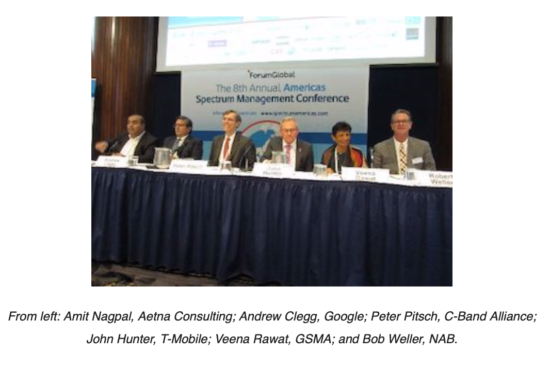Panelists discussing C-Band’s future locked horns during a panel discussion of the Americas Spectrum Management Conference this week. The issue is key, as FCC Chairman Ajit Pai and Commissioner Michael O’Rielly said at the conference they hope the agency acts later this fall on the issue.
Google Spectrum Engineering Lead Andrew Clegg said his company’s plan concerns allowing shared use of the portion of the C-band spectrum that remains after a chunk is auctioned for wireless use.
“You repack remaining users, and allow point-to-multipoint use,” in what remains, Clegg said. “You no longer have the luxury of these huge protection zones.” He claimed Google’s plan will work and not cause harmful interference with earth stations.
Broadcasters support the C-Band Alliance plan. CBA Head of Advocacy and Government Affairs Peter Pitsch called C-band the “goldilocks” of spectrum for 5G. The CBA plan calls for re-purposing and auctioning 200 MHz of the band, although he said the group is looking at possibly re-purposing more than that. “The problem is, it’s used to distribute broadcast programming to nearly 120 million homes. Think of all the folks getting ESPN and NPR. They still want that. This situation cries out for a market-driven, de-centralized process, which is what the CBA plan provides.” He also said the CBA plan offers the quickest path to free up the spectrum.
T-Mobile favors a different plan. Senior Director of Technology and Engineering Policy John Hunter said the CBA plan is like, “when someone has their hands on the spigot to limit supply. That drives up the price. 200 MHz is still woefully short to meet U.S. demand.” He credited the ACA/CCA/Charter proposal as “being good.” Hunter added the carrier favors an incentive auction, not a private auction, (which he called “a sham”) as put forth by the CBA.
NAB VP Spectrum Policy Bob Weller said of the utmost importance to broadcasters is that after the transition, they can use the band without signal degradation and that their moving costs are picked up. As for the proposal to share the remainder of the C-band after they are re-packed, Weller said: “We’re not necessarily opposed to shared use but we would like it to be in a separate docket after which reapportion details are settled.”
Many of the proposals call for broadcasters using fiber as a backup if the satellite signal fails. “C-band is reliable and new earth stations can be added,” he said. Fiber, however, “is susceptible to backhoe fades. It’s also rarely redundant. The other proposals do not envision installing redundant fiber runs with independent paths. The nation’s race to 5G must not sacrifice the nation’s position as the leader in content,” Weller emphasized.
A big point of contention is whether there should be an FCC or private auction of C-band spectrum. T-Mobile favors an FCC auction. Hunter called the notion of a private auction, as envisioned by the CBA, a “private door sale, not a market-based solution.” He predicted in that scenario, most of the spectrum would go to AT&T and Verizon.
Pitsch replied, “Let’s talk about windfalls. There are financial windfalls every day. The question is are they efficient?”
The satellite companies behind the CBA proposal are prepared to spend, “billions of dollars to keep their customers whole,” said Pitsch. He added: “This proposal frees up the spectrum before other plans and is more efficient.”
By Leslie Stimson, Inside Towers Washington Bureau Chief
September 26, 2019





Reader Interactions